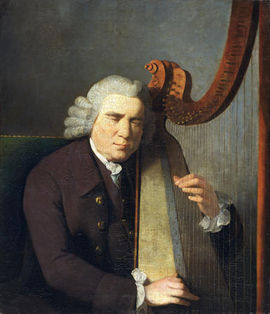Annotation:Nos Galan: Difference between revisions
No edit summary |
No edit summary |
||
| (10 intermediate revisions by 2 users not shown) | |||
| Line 1: | Line 1: | ||
---------- | |||
---- | {{TuneAnnotation | ||
|f_tune_annotation_title=https://tunearch.org/wiki/Annotation:Nos_Galan > | |||
'''NOS GALAN''' (New Year's Eve). Welsh, Air (2/4 time). F Major. Standard tuning (fiddle). AAB. This Welsh harp tune fist appears in John ("Blind Parry of Ruabon") Parry's (c. 1710-1782) '''Twelve Airs for One and Two Guitars''', 1781 edition (where it is an untitled air) | |f_annotation='''NOS GALAN''' (New Year's Eve). AKA - "New Years Gift," "Nôs Galan." Welsh, Air (2/4 time). F Major. Standard tuning (fiddle). AAB. This Welsh harp tune fist appears in John ("Blind Parry of Ruabon") Parry's (c. 1710-1782) '''Twelve Airs for One and Two Guitars''', 1781 edition (where it is an untitled air). It was followed by a printing in Edward Jones's (Bardd y Brenin) '''Musical and Poetical Relicks of the Welsh Bards''' (1784, p. 159) who gave it the name "Nos Galan," with a lyric in English and Welsh (that seems to have little to do with the holiday). It is ancestral or a precursor to the air for the familiar Christmas carol "Deck the Halls," but originally was a dance tune, the melody providing the musical vehicle for dancers who would circle around, improvising spontaneous lyrics (with the harp playing the tag melody that is now sung as "Fa-la-la-la-la"). In the 19th century other lyrics were added: | ||
<blockquote> | |||
< | ''Toil and trouble lie behind us,''<br> | ||
<br> | ''Fal la la, etc.,''<br> | ||
< | ''Think no more of chances dreary''<br> | ||
< | ''Fal la la, etc.''<br> | ||
'' | ''While the well-known strains remind us,''<br> | ||
<br> | ''Fal lal la, etc.''<br> | ||
<br> | '' 'Tis the Eve of New Year merry,''<br> | ||
< | ''Fal al la, etc.''<br> | ||
</blockquote> | |||
'' | [[File:parry.jpeg|270px|thumb|right|John Parry, painted by his son, William Parry (1742–1791)]] The tune also accompanies the Welsh dance "Dawns Flodau Nantgarw." "[[March in Bluebeard]]" also was informed by melodic material from "Nos Galan." The Christmas carol "Deck the Halls (with boughs of holly)" is also very closely related. | ||
<br> | |f_source_for_notated_version= | ||
<br> | |f_printed_sources=William Bingley ('''North Wales...delineated from two excursions, vol. 2'''), 1804; p. 9. Edward Jones ('''A choice collection of 51 Welsh airs'''), 1863; p. 39. | ||
</ | |f_recorded_sources= | ||
|f_see_also_listing= | |||
'' | }} | ||
------------- | |||
Latest revision as of 01:41, 30 September 2023
X:1 T:Nôs Galan [New Yea's Eve] %written Calan (probably a typo) M:C L:1/8 S:John Parry, British Harmony, London, 1781, p. 7 N:Fleischmann no. 2052 K:G d3 c B2 A2|G2 A2 B2 G2|ABcd c2 BA|G2 ~F2 G4:||: A2 B2 c2 A2|B2 c2 d2 A2|Bc d2 cd e2|=f2 e2 d4| d3 c B2 A2|G2 A2 B2 G2|ABcd c2 BA|G2 ~F2 G4:|
NOS GALAN (New Year's Eve). AKA - "New Years Gift," "Nôs Galan." Welsh, Air (2/4 time). F Major. Standard tuning (fiddle). AAB. This Welsh harp tune fist appears in John ("Blind Parry of Ruabon") Parry's (c. 1710-1782) Twelve Airs for One and Two Guitars, 1781 edition (where it is an untitled air). It was followed by a printing in Edward Jones's (Bardd y Brenin) Musical and Poetical Relicks of the Welsh Bards (1784, p. 159) who gave it the name "Nos Galan," with a lyric in English and Welsh (that seems to have little to do with the holiday). It is ancestral or a precursor to the air for the familiar Christmas carol "Deck the Halls," but originally was a dance tune, the melody providing the musical vehicle for dancers who would circle around, improvising spontaneous lyrics (with the harp playing the tag melody that is now sung as "Fa-la-la-la-la"). In the 19th century other lyrics were added:
Toil and trouble lie behind us,
Fal la la, etc.,
Think no more of chances dreary
Fal la la, etc.
While the well-known strains remind us,
Fal lal la, etc.
'Tis the Eve of New Year merry,
Fal al la, etc.


